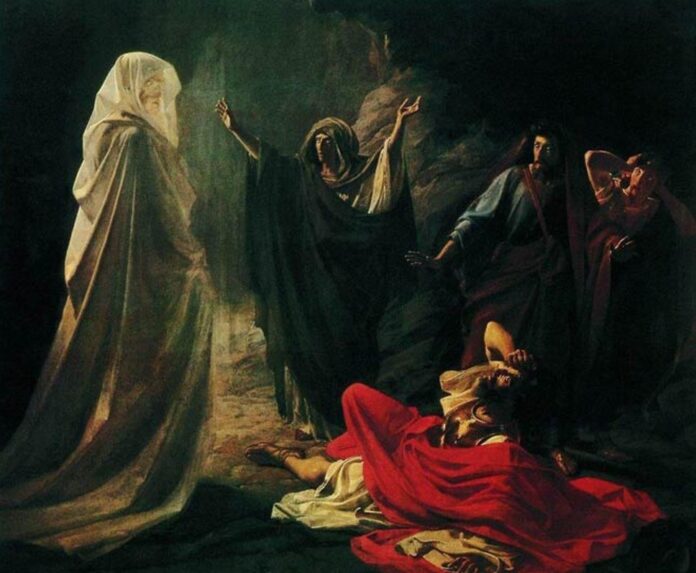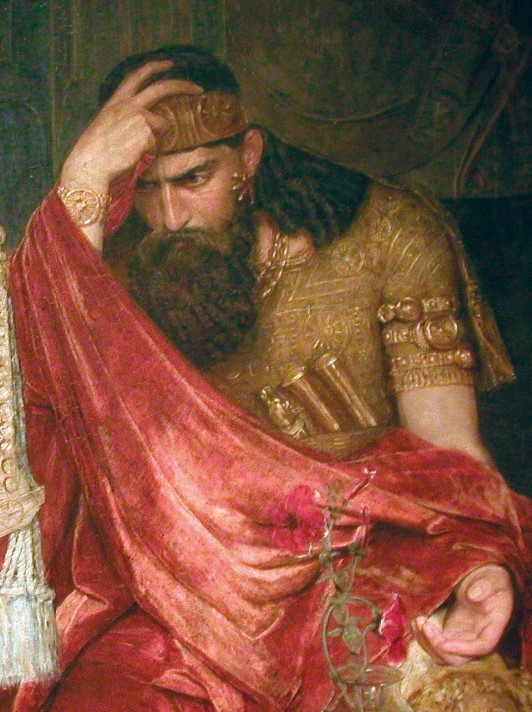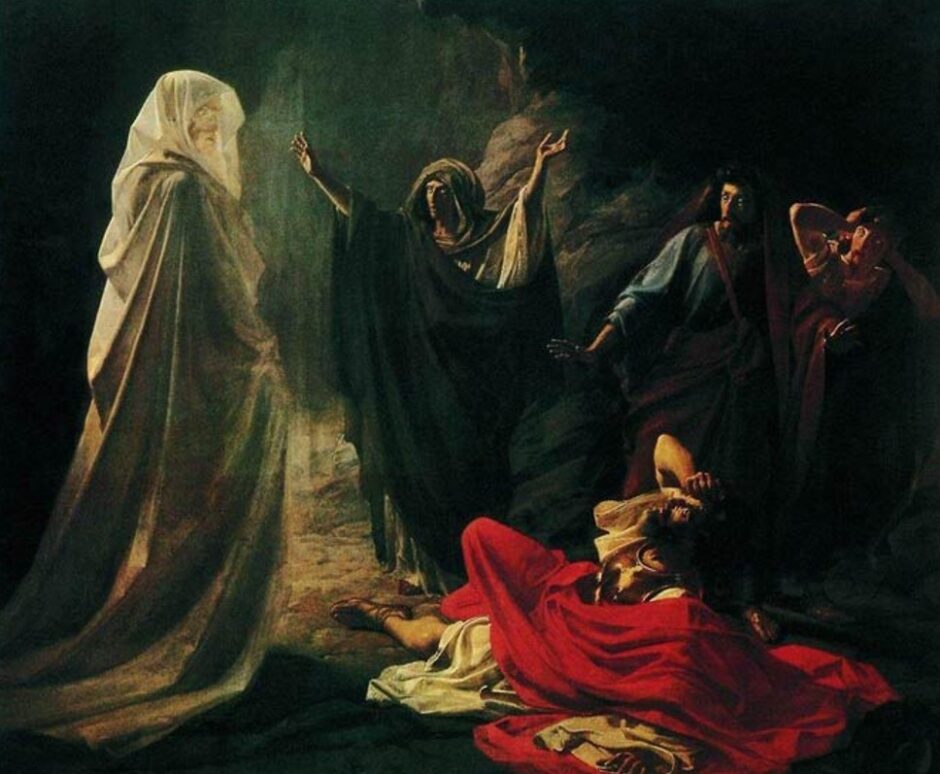Saul was God’s answer to Israel’s demand for a king. They weren’t content with being ruled by God: they wanted a human monarch they could see and be proud of and loyal to. The prophet Samuel tried to dissuade them.
‘But the people refused to obey the voice of Samuel. And they said, “No! But there shall be a king over us, that we also may be like all the nations, and that our king may judge us and go out before us and fight our battles”’ (1 Samuel 8:19–20).
Getting What You Ask For
So God gave them what they wanted. Perhaps by the time Saul’s reign was finished, when he and his army lay dead on the battlefield, some of the people reflected on a lesson learnt. God knows what is best for His children, He guides them and nurtures them through all their lives’ experiences in order to develop their characters. ‘If you then, who are evil, know how to give good gifts to your children, how much more will your Father who is in heaven give good things to those who ask him! (Matthew 7:11). If we insistently ask for something that’s not actually good for us, then in order to teach us a lesson He may just give us what we ask for!
In 1 Samuel chapters 9–10 we’re introduced to Saul, and Samuel anoints him as king. He was just what the people wanted—tall, charismatic, and a capable leader and soldier. His early reign was marked by significant achievements, as he united the nation and subdued its enemies (1 Samuel 14:47–48). But as his reign proceeds we see him descend into paranoia, exploiting the people and abusing his power. He was more concerned with jealously guarding his throne from an imagined threat by his young captain David, than serving the national interest.
A Godless Man
A turning point in Saul’s reign is in 1 Samuel 15. God gave him a mission to destroy Israel’s old enemies the Amalekites. He carried out the mission in a half-hearted way, and thought that would be good enough. Samuel’s assessment of his conduct was clear—he had rebelled against God’s wishes, and that was serious: ‘For rebellion is as the sin of divination, and presumption is as iniquity and idolatry. Because you have rejected the word of the Lord, he has also rejected you from being king”’ (15:23).
Idolatry means worshipping false gods; divination means seeking special supernatural knowledge, for example by occult practices. They’re gross sins which God strenuously warned His people against. Samuel said, when you disobey God because you think you know better, that’s as bad as committing the most blatant sins. Think about that!
So what was the cause of Saul’s failure? If you read the story of his life, you’ll notice a simple fact—he was not much interested in God. He was not a man of faith. He preferred to do things his own way, than God’s way. His attitude is presented in contrast to the attitude of his successor David, whom God called ‘a man after his own heart’ (1 Samuel 13:14).
The Last Battle Approaches
As his reign progressed, Saul drifted away from God. He became increasingly preoccupied with hunting for David, who had to flee with his band of men into the wilderness.
Samuel died. Saul hadn’t seen him for years (1 Samuel 15:35)—they had nothing in common. But there came a time when the Philistines amassed an army and came to engage with Israel, and Saul remembered God.
The Philistines assembled and came and encamped at Shunem. And Saul gathered all Israel, and they encamped at Gilboa. When Saul saw the army of the Philistines, he was afraid, and his heart trembled greatly. And when Saul enquired of the Lord, the Lord did not answer him, either by dreams, or by Urim, or by prophets (1 Samuel 28:4–6).
A wayside pulpit pro-claimed, “God is your steering wheel, not your spare wheel!” Isn’t that true? If we live our lives without a thought for God or what He wants from us, should we really expect Him to be there when we need Him? The writer of Proverbs paints a picture of wisdom, warning us to listen while we have opportunity, because the time may come when there’s no longer opportunity. Then, ‘they will call upon me, but I will not answer; they will seek me diligently but will not find me. Because they hated knowledge and did not choose the fear of the Lord’ (Proverbs 1:28–29).
Saul was desperate. He applied his own logic, and decided that he needed to speak to his old mentor Samuel at any cost. He needed a medium.
Necromancy—the practice of supposedly communicating with the dead—was a feature of the pagan religions of the Canaanites who had previously occupied the land of Israel. God had told His people to get rid of all vestiges of false Canaanite religion, including sorcerers, charmers, necromancers and mediums (Deuteronomy 18:10–12). One of the successes of Saul’s early reign was that he had rid the land of these practices. But it seems to have been easy enough to find a medium who had escaped the purge. His servants located a woman in the nearby town En-dor.
So Saul disguised himself and put on other garments and went, he and two men with him. And they came to the woman by night. And he said, “Divine for me by a spirit and bring up for me whomever I shall name to you… Then the woman said, “Whom shall I bring up for you?” He said, “Bring up Samuel for me.” When the woman saw Samuel, she cried out with a loud voice. And the woman said to Saul, “Why have you deceived me? You are Saul” (1 Samuel 28:8–12).
It’s not clear what exactly happened. Was it a vision, or did God actually raise Samuel to life for Saul’s benefit? Certainly, the medium was shocked at the sight—her occupation relied on masquerading and duping her clients, this would have been the first time in her career something supernatural had actually happened. She immediately realised that this was God’s work, and that the man before her was none other than the king.
The king said to her, “Do not be afraid. What do you see?” And the woman said to Saul, “I see a god coming up out of the earth.” He said to her, “What is his appearance?” And she said, “An old man is coming up, and he is wrapped in a robe.” And Saul knew that it was Samuel, and he bowed with his face to the ground and paid homage (vs. 13–14).
Did Saul see Samuel standing before him, or was the conversation conducted through the medium?
Then Samuel said to Saul, “Why have you disturbed me by bringing me up?” Saul answered, “I am in great distress, for the Philistines are warring against me, and God has turned away from me and answers me no more, either by prophets or by dreams. Therefore I have summoned you to tell me what I shall do.” And Samuel said, “Why then do you ask me, since the Lord has turned from you and become your enemy?… the Lord will give Israel also with you into the hand of the Philistines, and tomorrow you and your sons shall be with me” (vs. 15–19).
‘Rebellion is as the sin of divination’, Samuel had told Saul, years ago. Saul had pursued a life of rebellion, and it had led him to this: resorting to actual divination in his desperation for comfort.
He threw himself on the ground (v. 20). Who would not be moved by this poor man’s misery and distress? The years of his reign, the glory and the adulation and the achievements he’d made, the dynasty he’d tried to build—with the crushing blow of Samuel’s words he remembered that it had all been without God, and now God was going to sweep him away. ‘Those who are far from you shall perish; you put an end to everyone who is unfaithful to you’ 6+(Psalm 73:27). How many people approach the end of their lives, and realise too late that they’ve been wasted?
Heaven-Going
It’s worth pointing out that Samuel said he had been ‘brought up’. There’s an idea that good people go to heaven when they die. If anyone had gone to heaven it would have been Samuel, the faithful prophet. But he was ‘brought up’ from below, and he told Saul that tomorrow he and his sons would be with him, in the same place.
The Bible has a name for this place—‘Sheol’. It means the pit or the grave, and we all go there: ‘Whatever your hand finds to do, do it with your might, for there is no work or thought or knowledge or wisdom in Sheol, to which you are going’ (Ecclesiastes 9:10). The Bible’s promise of eternal life involves resurrection from the grave at Christ’s return, not heaven-going (John 11:23–24).
The Last Supper
Consider Saul, devastated, prostrate on the floor. He had not eaten all day and was exhausted, and now he refused to eat. The Bible never wastes words, but it devotes five verses (1 Samuel 28:21–25) to describing how the woman and his two servants persuaded him to eat a meal. Then he went out into the night. The following day the Israelite army was routed. Saul saw his sons slain, and he fell on his sword and killed himself.
The Gospel records describe the last supper of the Lord Jesus, which he shared with his disciples before leading them out into the night where he was betrayed and arrested. He commanded his disciples to keep the feast in memory of him (1 Corinthians 11:24–25), and ever since then his followers have shared bread and wine in grateful obedience. It’s sometimes called the ‘love feast’.
Saul, the king who had no time for God, realised at the end that his life had been a failure, and led his people to catastrophic defeat by their enemies. Jesus, the man who devoted his life to his Father’s service, willingly died on the cross in order to achieve deliverance from our ultimate enemy—sin and death.
When Christ had offered for all time a single sacrifice for sins, he sat down at the right hand of God, waiting from that time until his enemies should be made a footstool for his feet (Hebrews 10:12–13).
He’s still waiting. We believe it won’t be long now before he returns, to take his rightful throne (Luke 1:32) and bring peace, prosperity and blessing to the world.
Katie Cabeira






